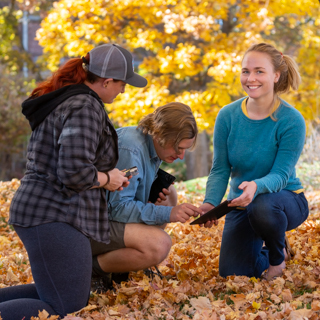Finding a Faculty Mentor
Once you’ve narrowed down your interests, it’s time to find faculty you are interested in working with. Through this process, you’ll have the chance to build your academic network and create connections across your department and campus. Finding a mentor whose scholarship interests match yours and then building a good working relationship with them is key to a successful research or creative scholarship project.
Tips
Every undergraduate research and creative project requires thoughtful and sustained collaboration between the student researcher and a faculty mentor. It is the responsibility of the student to seek out an appropriately qualified faculty mentor and obtain their written consent to serve in that role (if the project is not a paid position).
Your mentor’s role will vary depending on how you are engaging in research. If you are working as a paid research assistant, you may work directly with graduate students or more experienced assistants while the faculty member takes on a supervisory role. If you are working with a faculty mentor on your own project, they will take on more of a mentorship role.
Be aware that the service of a faculty mentor role is entirely voluntary for faculty members at UM.
Some examples of the responsibilities of a mentor are:
- Helping you determine if your project will require review from a UM review committee
- Talking through how your project will be carried out
- Reviewing and critiquing project or funding proposals
- Assisting you in developing a budget
- Writing a letters of reference/support for funding
- Assisting you in identifying off campus locations for research and transportation
- Suggesting forums for presenting or publishing your work, especially if presenting is a requirement of your senior thesis
If you haven’t already, read up on Ways to Get Involved - you should have some clarity around what kind of opportunity or involvement you are looking for before you start talking to faculty. Are looking for a mentor to guide your senior thesis? Would like to work with a faculty on their existing projects? Are still looking for advice and feedback to clarify your interests? You’ll also want to consider realistically how much time you have to put towards the project and when you’ll have time to engage (e.g., next semester as a 3-credit course, over the summer full time).
Faculty profiles on department websites include a wealth of useful information, including biographical and educational information, courses taught, research interests, publications and projects, CVs, professional experience, and office hours. Their profile pages may also have links to personal or lab websites that provide additional information.
Faculty and graduate teaching assistants you know through your coursework are a great resource to point you towards research opportunities, resources, and faculty members doing research in your interest area. Set up an appointment during their office hours and tell them what you are interested in and why. Ask them for recommendations on what to read, watch, or review; who else to talk to on or off the UM campus; and for examples of ongoing projects or opportunities similar to your interests. See the information on contacting faculty and meeting with faculty for resources and tips.
If there is a faculty member you are interested in working with who you don’t know already, taking a course with them is a great way to get to know them and their work on a deeper level.
